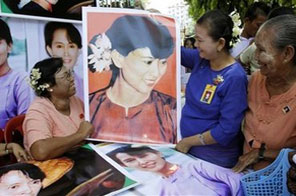US, ASEAN fail to call Kyi's release
SINGAPORE: President Barack Obama and his Southeast Asian counterparts are calling on Myanmar's junta to hold credible elections, but have stopped short of demanding the release of pro-democracy leader Aung San Suu Kyi and other political prisoners.
A joint statement to be issued after a summit Sunday between the U.S. president and leaders of the Association of Southeast Asian Nations their first ever devotes an entire section to Myanmar, a major irritant in relations between the two sides.
The leaders emphasized, "the general election to be held in Myanmar in 2010 must be conducted in a free, fair, inclusive and transparent manner in order to be credible to the international community," according to a final draft of the statement. A copy was obtained by The Associated Press.
Obama, in a broad policy speech in Tokyo on Saturday, made a point of mentioning Suu Kyi by name.
But the leaders' statement does not make any mention of political prisoners including Nobel Peace laureate Suu Kyi, who has spent 14 of the last 20 years in detention. The omission is glaring, given the U.S. had insisted on the inclusion of the clause in a previous draft.
According to the old draft, the U.S. wanted to insert a line calling on the junta to "help create the conditions for credible elections, including by releasing political prisoners and initiating a dialogue with political parties and ethnic minority groups."
The final draft fails to mention the release of political prisoners, including Suu Kyi. It only has leaders calling on the military government to initiate "a dialogue with all stakeholders to ensure that the process is fully inclusive."
The Myanmar government has said it intends to hold elections next year but has not clarified whether Suu Kyi will be allowed to participate. The junta refused to honor the result of the last elections in 1990 when Suu Kyi's party won by a landslide.
Although the United States recently eased its policy toward Myanmar by initiating talks with the generals, it has made clear economic sanctions won't be lifted until Suu Kyi is released.
Earlier this month, two senior U.S. diplomats went to Myanmar for talks, and also had a private meeting with Suu Kyi. It was the highest-level U.S. visit to Myanmar in 14 years.
Sunday's U.S.-ASEAN summit, to be held just after the Asia-Pacific Economic Cooperation forum ends, is the outcome of the new thinking in Washington that ignoring Myanmar will not yield any results, and relations with Southeast Asia should not be held hostage by the junta.
Previous administrations had refused to hold a summit with ASEAN because it meant sitting at the same table with Myanmar, which is a member of the regional grouping.
On Sunday, Obama and Myanmar Prime Minister Gen. Thein Sein likely will sit side by side, but it is not known if they will hold direct talks.
Analysts say the U.S. will continue to be tough, even in face-to-face talks.
"No one should expect America to simple say nice, soothing things to the generals in Myanmar," said Simon Tay of the Singapore Institute for International Affairs think tank. "The signals that the Americans and all of us in Asia expect are for clean, decent elections in Myanmar."






